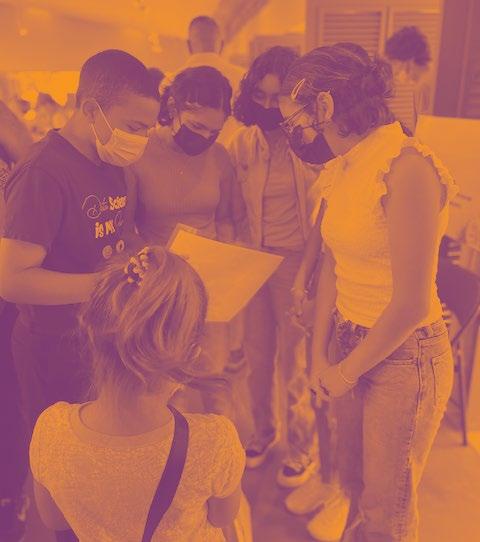
3 minute read
Diversity, Equity, Inclusion, Access, and Belonging
The pandemic, which exposed deep racial and socioeconomic disparities, became a catalyst for the education sector to begin reckoning with systemic racism and inequity, and to examine the disenfranchisement of students of color, especially Black and Brown students, as well as educators and researchers of color.
TERC is committed to developing strategic solutions that dismantle systemic racism, rebuild more equitable educational environments, and foster a thriving STEM identity for all. Our ideologies and practices must be undergirded in a foundational understanding of equity, access, inclusion, and belonging. Ongoing self-reflection, critical evaluation, and re-evaluation of antiracist and culturally responsive practices are important factors in achieving this goal.
To center equity, TERC’s research must center marginalized voices and perspectives.
A number of TERC’s projects (some of them detailed in this report) center the voices of and collaborate with underrepresented and marginalized populations in STEM education, including Black and Brown students, English learners, neurodiverse learners, students with sensory disabilities, rural communities, and more.
Our work broaches educational equity from different perspectives and access points, with projects researching authentic and equitable family engagement, empowering indigenous frameworks and ways of knowing, supporting teacher diversity in professional development, conducting culturally responsive STEM education evaluation, expanding informal STEM education environments—from makerspaces and museums to after-school programs—and building research capacity for minority-serving institutions/organizations.
The TERC Scholars Program, STEM Education Research through a Social Justice Lens, provides undergraduate internships for students from racially and ethnically underrepresented backgrounds to diversify STEM education research and exposure to career pathways.
In 2023, TERC will welcome a cohort of student researchers and will support the direction of a new NSF Advancing Informal STEM Learning (AISL) Equity Resource Center called Reimagining Equity and Values in Informal STEM Education (REVISE), which will improve access of marginalized researchers and research organizations to federal research funding in the informal STEM education environment.

Head Start on Engineering is a multi-component, bilingual program designed to engage preschool children and their caregivers in the engineering process.
TERC’S internal culture must foster greater equitable access and career growth opportunity.
As we critically investigate the components of equitable learning environments, an equitable and inclusive workplace culture must reflect this same effort and analysis.
As an organization, we continue to educate ourselves on equity-oriented and culturally responsive research frameworks to help inform policy and practice and evoke transformative social justice through our projects. The Office of Diversity, Equity, Inclusion, and Belonging (DEIB) curates book discussions (for example, Race After Technology and White Fragility), affinity groups, journal clubs (an Equity in STEM Education Research series), and social groups.
The Office of DEIB has collaborated to create an in-house professional development webinar series to support growth and create conversation on improving TERC culture across topics such as the neurobiology of implicit bias, sexual harassment and grievance procedures, addressing microaggressions and power dynamics, and diversifying professional networks. TERC has emphasized the essential importance of mentorship from senior leaders to support emerging leadership, career sustainability and growth.

Data Clubs introduce middle school youth, in both rural and urban out-of-school settings, to the power of data by giving them tools for visualizing and analyzing data on topics they care about.
Together, this work will continue to refine our strategies and resources to fortify an infrastructure that successfully recruits and retains underrepresented staff and truly serves the needs of all learners.




